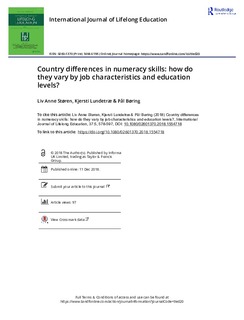Country differences in numeracy skills: how do they vary by job characteristics and education levels?
Journal article, Peer reviewed
Published version

Åpne
Permanent lenke
http://hdl.handle.net/11250/2583345Utgivelsesdato
2018Metadata
Vis full innførselSamlinger
Originalversjon
Støren, L. A.; Lundetræ, K.; Børing, P. (2018). Country differences in numeracy skills: how do they vary by job characteristics and education levels? International Journal of Lifelong Education, 37(5), 578-597. 10.1080/02601370.2018.1554718Sammendrag
To what extent do favourable job characteristics contribute to the variation in numeracy skills between countries? Based on theory of maintenance and further development of pre-existing skills, this is explored by applying data on numeracy skills among employed persons in seven European countries participating in the Survey of Adult Skills (PIAAC). Regression analyses are used to examine the extent to which numeracy skills vary with job characteristics and education levels across the seven countries, when controlling for industrial sector, work hours, demographic variables (gender, age, Western and Non-Western immigrant background), cultural capital (books at home and parental education level). The findings indicate that job characteristics and the individuals’ educational level have large and equal statistical impact on the total skills variation in the seven countries. However, regarding the country- differences, variations in education level play a lesser role than job characteristics.
